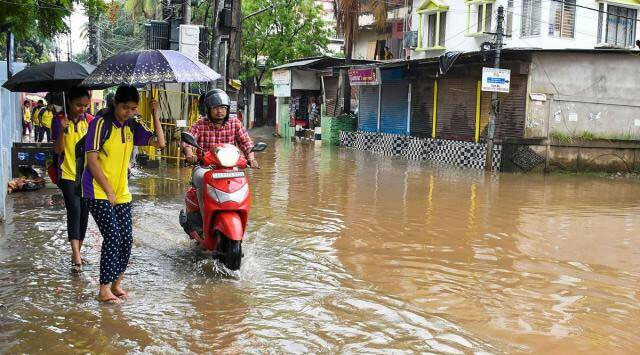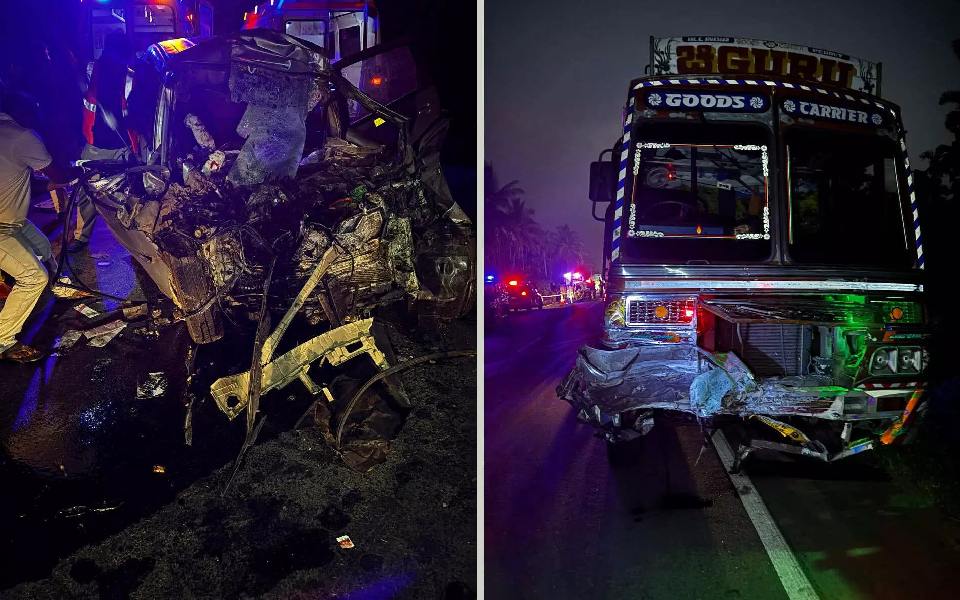Guwahati (PTI): The flood condition in Assam remained grim on Monday with overnight heavy rainfall across several parts of the state, inundating villages, towns and farmlands.
The India Meteorological Department has issued a 'Red Alert' and predicted 'very heavy' to 'extremely heavy' rainfall across several districts of Assam till Thursday.
IMD's Regional Meteorological Centre (RMC) in Guwahati has issued a 'Red Alert' with prediction of "Heavy (7-11 cm in 24 hours) to Very Heavy (11-20 cm in 24 hours) with extremely heavy rainfall (over 20 cm in 24 hours)" over Lower Assam districts of Kokrajhar, Chirang, Baksa, Barpeta and Bongaigaon.
During the same period, "heavy to very heavy" rainfall is very likely over Dhubri, Kamrup, Kamrup Metropolitan, Nalbari, Dima Hasao, Cachar, Goalpara and Karimganj districts, it added.
The RMC has issued an 'Orange Alert' for Tuesday, followed by a 'Yellow Alert' for the subsequent two days.
'Red Alert' signifies taking immediate action, while 'Orange Alert' implies to be prepared for action and 'Yellow Alert' stands for watch and be updated.
According to the daily flood report of the Assam State Disaster Management Authority (ASDMA), more than 33,400 people are hit due to floods in Cachar, Darrang, Dhemaji, Dibrugarh, Golaghat, Hojai, Lakhimpur, Nagaon, Nalbari, Sonitpur, Tinsukia and Udalguri districts.
Lakhimpur is the worst hit with over 25,200 people affected, followed by Dibrugarh with more than 3,800 people and Tinsukia with almost 2,700 persons, it added.
The administration has been operating one relief camp, where nine people are taking shelter, besides running 16 relief distribution centres in three districts.
At present, 142 villages are under water and 1,510.98 hectares of crop areas have been damaged across Assam, ASDMA said.
Massive erosions have been witnessed in Biswanath, Bongaigaon, Dibrugarh, Kokrajhar, Lakhimpur, Majuli, Morigaon, Nagaon, Sivasagar, Sonitpur, South Salmara and Udalguri districts, it added.
Places in Dima Hasao and Karimganj have reported incidents of landslides due to heavy rainfall.
Embankments, roads, bridges and other infrastructure have been damaged by flood waters in Sonitpur, Lakhimpur, Cachar, Dhemaji, Goalpara, Nagaon, Udalguri, Chirang, Dibrugarh, Kamrup, Karbi Anglong, Karimganj, Bongaigaon, Majuli, Morigaon, Sivasagar and South Salmara districts.
The Brahmaputra at Neamatighat, while its tributaries Puthimari at NH Road Crossing and Kopili at Kampur are flowing above the danger marks, the report said.
Let the Truth be known. If you read VB and like VB, please be a VB Supporter and Help us deliver the Truth to one and all.
Kyiv, May 12 (AP): Russia launched more than 100 Shahed and decoy drones at Ukraine in nighttime attacks, the Ukrainian air force said Monday, after the Kremlin effectively rejected an unconditional 30-day ceasefire in the more than three-year war, but reiterated that it would take part in possible peace talks later this week without preconditions.
There was no direct response from the Kremlin, meanwhile, to Ukrainian President Volodymyr Zelenskyy's challenge for Russian leader Vladimir Putin to meet him for face-to-face peace talks in Turkiye on Thursday.
Kremlin spokesman Dmitry Peskov on Monday refused to say who might travel to Istanbul from the Russian side.
“Overall, we're determined to seriously look for ways to achieve a long-term peaceful settlement. That is all,” Peskov said.
The United States and European governments are making a concerted push to stop the fighting, which has killed tens of thousands of soldiers on both sides, as well as more than 10,000 Ukrainian civilians. Russia's invading forces have taken around one-fifth of Ukraine in Europe's biggest conflict since World War II.
In a flurry of diplomatic developments over the weekend, Russia shunned the ceasefire proposal tabled by the US and European leaders, but offered direct talks with Ukraine on Thursday.
Ukraine, along with European allies, had demanded that Russia accept a ceasefire starting Monday before holding peace talks. Moscow effectively rejected that proposal and instead called for direct negotiations in Istanbul.
West increases pressure on Putin
US President Donald Trump insisted that Ukraine accept the Russian offer of talks. Zelenskyy went a step further Sunday and put pressure on Putin by offering a personal meeting.
France added its voice to that offer Monday, with Foreign Minister Jean-Noel Barrot urging Putin to accept — though Barrot repeated the European position that a truce must be in place before the talks.
Russia's failure to join the ceasefire offered by Ukraine would bring further sanctions on Moscow, European leaders say. Germany on Monday reminded Russia of that intention.
“The clock is ticking. There are 12 hours until the end of the day and, if the ceasefire doesn't stand by then, the European side will keep to the agreement” to implement further sanctions, German government spokesperson Stefan Kornelius said.
Peskov, the Kremlin spokesman, said that giving ultimatums to Russia was “unacceptable” and wouldn't work.
"You cannot talk to Russia in this language,” he told reporters.
Also Monday, UK Foreign Secretary David Lammy was hosting in London senior diplomatic officials from France, Italy, Germany, Spain, Poland and the European Union to discuss how best to fight back against Russian aggression.
Turkish Foreign Minister Hakan Fidan said that he expected the two sides to reach a compromise in coming days that might break the deadlock over whether talks could begin without a truce in place.
Russian and Ukrainian officials are mindful of public opinion in their countries and are trying to secure the support of the United States for their stances, he said in explaining the delay.
Ukrainians react to peace prospects
In Kyiv, residents expressed a mixture of hope and despondency at the latest peace efforts.
Putin doesn't want a truce to halt the war, because “it will mean that he has lost,” Antonina Metko, 43, told The Associated Press. “That is why they are postponing it. And everything will continue in the same way. Unfortunately.”
Vladyslav Nehrybetskyi, 72, was more upbeat, saying that “the seeds” of a peace agreement are being sown, even though “a difficult process” lies ahead. “So let's hope.”
Ukraine's government has tried to keep up the momentum for a peace deal started by the Trump administration.
“Ukraine wants to end this war and is doing everything for this,” Zelenskyy said on Telegram Monday. “We expect appropriate steps from Russia.”
The Ukrainian leader said that he told Pope Leo XIV about peace efforts during his first phone conversation with the new pontiff.
Ukraine is counting on the Vatican's help in securing the return of thousands of children that the government says have been deported by Russia, Zelenskyy said, adding that he had invited the pope to visit Ukraine.
In his first Sunday noon blessing as pontiff, Leo called for a genuine and just peace in Ukraine.
“I carry in my heart the sufferings of the beloved Ukrainian people,” he said.
In 2022, in the war's early months, Zelenskyy repeatedly called for a personal meeting with Putin but was rebuffed, and eventually enacted a decree declaring that holding negotiations with him had become impossible.
Putin and Zelenskyy have only met once, in 2019. Trump says that “deep hatred” between the sides has made it difficult to push peace efforts forward.





